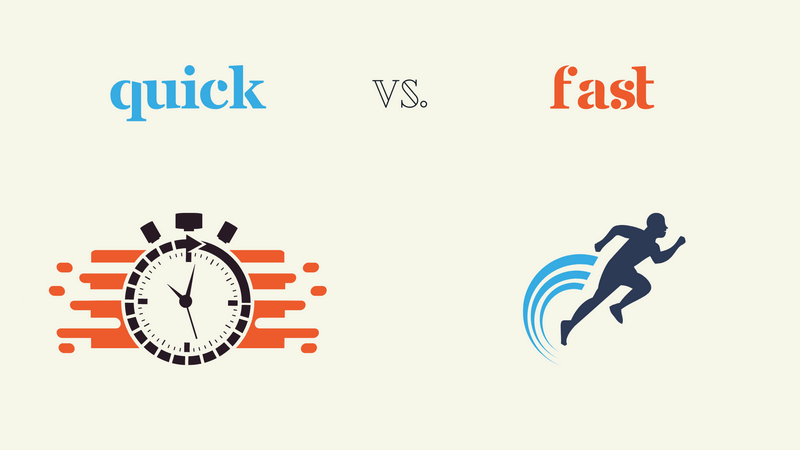Quick and fast are two words we often use to describe speed. Sometimes they mean the same thing, and sometimes there are subtle differences. In this post, we’re going to explain how to use “quick” and how to use “fast.”
The Basic Difference Between Quick and Fast
The main distinction between “quick” and “fast” is:
- “Fast” usually focuses on movement at a high speed
- “Quick” focuses on something happening in a short period of time
Obviously, if something can move at high speed, it should also be able to do something quickly (in a short amount of time). However, the reverse isn’t always true.
Examples Where They Are Basically Interchangeable
Take a boxer’s punches. We can describe them as quick or fast:
- They are fast because they move at a high speed, approximately 30 mph.
- They are quick because they happen in a short period of time, often less than one-tenth of a second.
In that situation, “quick” and “fast” are interchangeable – a quick punch is a fast punch, and vice versa.
Examples Where There Is a Difference
For a train or car, we almost always use “fast,” not “quick.” This is because we are focusing on its ability to move at a high speed, not on the time.
However, for a train or car ride, we can use “quick.” This focuses on the time the trip takes, not the speed at which the car or train is moving.
- If you take a slow train but only travel half a mile, that will be a quick train ride, even though the train is slow.
- If you take a fast train but travel 2,000 miles, that will not be a quick train ride, even though the train is fast.
So the main difference is:
- “Fast” focuses on the speed of movement
- “Quick” focuses on time
It often doesn’t really matter which one you use because fast things are often quick and quick things are often fast. So if you’re not 100% sure which one to use, just try your best and your message will probably still be clear even if you use the wrong one.
A Note on Grammar
“Fast” can be an adjective or adverb, but “quick” is only an adjective. The adverb form is “quickly.”
- He is a fast runner. (adjective)
- He runs fast. (adverb)
- He is a quick learner. (adjective)
- He learns quickly. (adverb)
💡An Interesting Case of Fast vs. Quickly
What about “fall asleep fast” or “fall asleep quickly”? We do say both, but which is correct?
We should say “fall asleep fast” because we use the verb ‘fall’ which shows movement. So “fast” is the right choice as the adverb describes movement.
Conclusion
Native speakers often use words like “quick” and “fast” interchangeably in conversation. Beginner to intermediate English learners mainly need to know the key differences discussed here.
Pay attention to how these words are used in real life. Take note when you hear new or interesting examples. Over time, you’ll gain an intuitive sense of when each word fits best.

